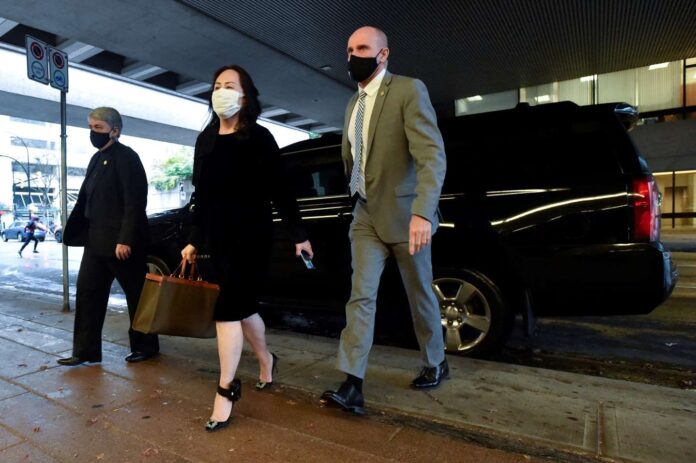
VANCOUVER/TORONTO (Reuters) – Cross-examination of Canadian border officials involved in the arrest of Huawei Chief Financial Officer Meng Wanzhou two years ago will continue in a British Columbia courtroom on Tuesday, as her lawyers seek to get her extradition to the United States thrown out.
Meng, 48, was arrested in December 2018 at Vancouver International Airport by Canadian police, on a warrant from the United States. She is facing charges of bank fraud for allegedly misleading HSBC about Huawei Technologies Co Ltd’s business dealings in Iran, causing the bank to break U.S. sanctions.
Meng has said she is innocent and is fighting the extradition from under house arrest in Vancouver, where she owns a home in one of Canada’s most expensive neighborhoods.
Her lawyers have alleged that abuses of process took place during her initial investigation by the Canadian border officials and arrest by the police in the airport, which violated her civil rights, arguing that should invalidate her extradition.
On Monday defense attorney Richard Peck said that Ben Chang, a Canadian police officer who allegedly gave identifying details about Meng’s electronic devices to the U.S. Federal Bureau of Investigation, had declined to testify. Peck called the move “concerning” and warned of “any number of consequences from his refusal to testify.”
Canada Border Services Agency officer Sanjit Dhillon will continue testifying on Tuesday, as prosecutors wrap up their questions and defense lawyers take the floor.
Huawei said in a statement Monday that the hearings had revealed “important information” about Meng’s arrest. It said the company continues to have “great confidence in both Meng’s innocence and the integrity of the Canadian judicial system.”
Meng’s arrest has soured diplomatic relations between Ottawa and Beijing. Soon after her detention, China arrested Canadian citizens Michael Spavor and Michael Kovrig on espionage charges.
Meng’s case is set to wrap up in April 2021, although the potential for appeals by either side mean the case could drag on for years.
(Reporting by Moira Warburton in Toronto and Tessa Vikander in Vancouver; Editing by Denny Thomas and Leslie Adler)
